#celtiberian
Text
My Drive Resource Libraries
Feel free to download, share, etc. I found most everything through open access journals, JSTOR, Anna's Archive, sci-hub, pdfs shared on other sns, etc.
Greek Polytheism & Hellenism
Roman & Italic Polytheism
Gaulish & Gallo-Roman Polytheism
Celtiberian Polytheism
#hellenism#helpol#cultus deorum#greek polytheism#polytheism#roman polytheism#gaulpol#gaulish polytheism#gaulish pagan#celtiberian
430 notes
·
View notes
Text

Ancient Greek híppos, Latin equus, Irish each, and Icelandic jór all mean 'horse', and Spanish yegua and Romanian iapă mean 'mare'. They're very different, yet they ultimately stem from the same Proto-Indo-European word. They drifted apart due to the sound changes they underwent.
What would their modern English, German, Dutch, French and Italian cognates look like if they had survived? I tell about it on my Patreon.
#historical linguistics#linguistics#language#etymology#english#latin#french#dutch#spanish#german#lingblr#old irish#irish#manx#scottish gaelic#celtiberian#gaulish#proto-germanic#old english#old saxon#proto-norse#old norse#icelandic#gothic#lithuanian#romanian#sardinian#old french#occitan#catalan
213 notes
·
View notes
Text
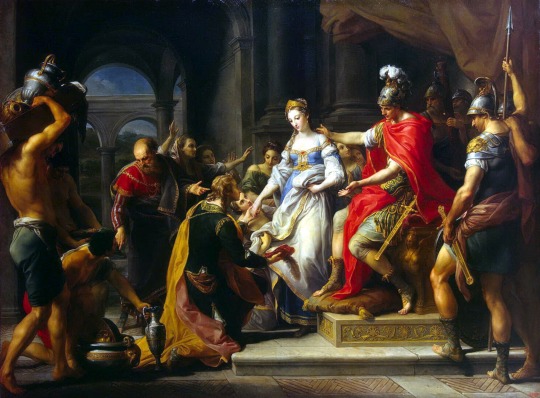
The Continence of Scipio by Pompeo Batoni
#scipio#art#pompeo batoni#publius cornelius scipio#scipio africanus#allucius#clemency#continence#ancient rome#roman#romans#roman republic#second punic war#punic wars#spain#hispania#iberia#iberian peninsula#cartagena#carthage#carthaginian#antiquity#rome#europe#european#history#livy#celtiberian#prince#titus livius
37 notes
·
View notes
Text
A research team has uncovered the long-lost ancient city of Titiakos and the remains of a Roman military camp in Soria Spain. This fascinating find has brought to light the traces of battles, minted coins, and the strategic genius of early Roman engineering.
#Celt#Iberian#Celtiberian#coin#projectile#Spain#coins#Roman Colonization & Expansion#Roman Military & Warfare#ancient#history#ancient origins
25 notes
·
View notes
Text
I was reading some of my old notebooks because, as you all probably already know, it is a great way to look back, see how my practice has grown, and revisit some old things I may have missed or forgotten about. And I found an interesting page about local witch lore. Specifically this bit caught my attention:
"The Witch finds the entrance to the Underworld guided by what appears to be local fauna, and once there, She enters the caves of the Underworld where She meets The Devil. To prove Herself worthy of Initiation, She goes through a series of four trials, where She must resist or outforce attacks".
I believe this particular piece of lore is Iberian in origin, does anybody else know of similar lore in other regions? even further, I'd love to hear from other witchcraft practitioners, does it sound familiar or resemble your own personal experiences with initiation as a witch?
#traditional witchcraft#folkloric witchcraft#folk witch#traditional witch#iberic witch#iberian witch#iberic witchcraft#iberian witchcraft#celtiberian#my notes#occult#witchblr
7 notes
·
View notes
Text
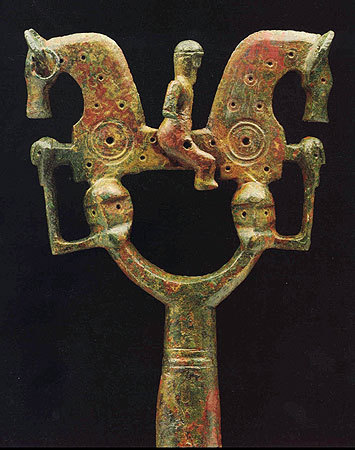
“The vital development of the Celtiberian people, similar to all other Celtic tribes, gravitated around values of high moral content... a clearly agonistic ethic led to the exaltation of war as a field where they could obtain the maximum fulfilment of the Roman virtus”.
- Gabriel Sopena Genzor. Ethics and Ritual. An Approximation to the Study of the Celtiberian Religiosity, 1995.
#Celtiberian#Celtiberia#Celts#Religiosity#paganism#european religions#european culture#pre-christian religions#war#virtus#Viriatus#Europe#European values#alain de benoist#julius evola#rene guenon#solar cult#sacrifice#Virtus god#ancient rome#indo-europeans
10 notes
·
View notes
Text
1 through 10 in Celtiberian:
Uinos
Duino
Tiris
Kuetuor
Kuenkue
Sues
Sektan
Oktu
Nouan
Tekam
Miscellaneous words:
Territory - Touzei
Water - Akwa
Meadow - Klounia
Man - Viro
Daughter - Tuater
Money, silver - Silabur
Horse - Ekuo
House - Togia
Inside - Somei
Part - Arznā
Sample statement;
“Eni Orosei uta Tigino tiatunei erecaias to Luguei araianom komeimu eni Orosei Ekuoisui-kue okris olokas togias sistat Luguei tiaso togias.”
“In Orosis and the surroundings of Tigino river, we dedicate the fields to Lugus. In Orosis and Equeiso the hills, the vegetable gardens and the houses are dedicated to Lugus.”
[x/x]
#celtiberian#teangacha ceilteacha#langblr#celtic languages#languages#language tumblr#vocabulary#language learning#mo fhoilseachán
6 notes
·
View notes
Note
Say something in Celtiberian
iste ankios iste esankios
I actually can't speak celtiberian, but i find joy studying what we have of the language like the first bronze of Botorrica where the said phrase is found. "If [it is] Enclosed, or [it is] not closed" The bronze of Botorrica is a legal text from the roman stipulating what can't and can't be done on the premises of the land concerning, forestry, husbandry and such things, also including payments and the tithe.
0 notes
Text
#drusuna#pagan folk#pagan music#paganism#pagan#nature sounds#celtiberian#celtiberians#celtic paganism#celtic#ritual pagan folk#ritual#gallaecia
1 note
·
View note
Text
just did a y-dna test. i’m not an expert in genetics but if i’m reading this right my haplogroup is r1b. more specifically the subclade r1b1a1b (r-m269), which is apparently the most common haplogroup in western europe, associated with steppe ancestry. and an even more specific subdivision is haplogroup r-df27, which is most concentrated in the region of the pyrenees (northeastern spain, southern france), and is associated with proto-celts, celts, and celtiberians. but even /more/ specifically i have the r-m153 mutation which seems to be unique to basque people ().
this makes sense though. my last name is of basque origin. so it’s exciting to have further confirmation.
but it’s interesting. and not just because this is my personal genetic heritage but the basque people have always been a historical curiosity of mine. they’re still very mysterious.
from what i can tell the basque people originate from some pre-indo-european neolithic people. but a few thousand years ago, as the indo-europeans migrate through europe, some small number of men with seppe ancestry eventually arrive in this basque region. and over some amount of time they basically /totally/ replace any native basque y-dna. like from what i can see the replacement was pretty sudden and i mean /total/. like 100%. so these steppe warriors came in took the basque women for themselves. but strangely, while leaving a pretty significant genetic influence, they don’t seem to have left much linguistic/cultural influence, though there’s still a lot of room for new information to pop up. but then it seems like from this point the basque people, with their new steppe ancestry, remain pretty much genetically (and culturally) isolated.
again, i’m no expert though.
#now i wanna do a ck3 campaign featuring the basque and create some basque atlantic empire#or maybe just celtiberian#as in play as either an iberian or celtic culture#then mix them together#since they are so genetically close irl#hell maybe i'll do a celt-basque campaign#but whose culture should i choose to predominate#the indo-european culture#or the old neolithic european culture
3 notes
·
View notes
Text
sometimes i want my special interests and hyperfixations to meet somewhere in a fic, but then i remember that nie huaisang and jiang cheng are in ancient china and my special interest is a bronze age culture from spain. so yeah
#the culture is the celtiberians btw#ill get emotional about them here at some point#mdzs#special interest#:)
2 notes
·
View notes
Text
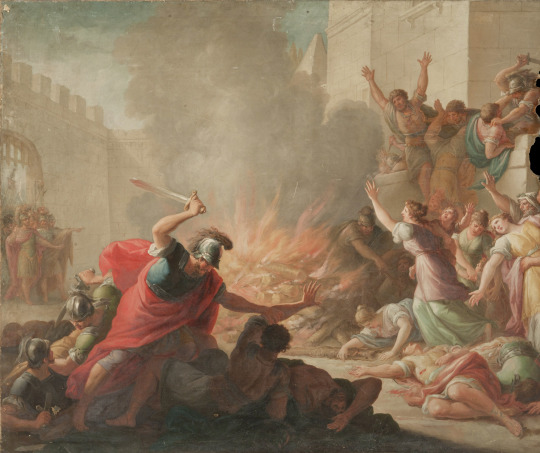
Antonio Guerrero (Spanish, 1777-after 1802)
The taking of Numantia, Detail, 1802
Real Academia de Bellas Artes de San Fernando
Numantia is an ancient Celtiberian settlement.
#Antonio Guerrero#art#numancia#numantia#1800s#roman#spanish#spanish art#iberia#hispanic#latin#mediterranean#fine art#european art#classical art#europe#european#oil painting#fine arts#europa#neoclassical art#neoclassical#neoclassicism#spanish neoclassical
34 notes
·
View notes
Text
Crevan ESPANE (???) aep Caomhan Macha.
But what if... Iberian elves?
Neolithic populations of the British Isles reveal genetic threads leading to present day Northern Spain and Portugal. Of particular interest, in relation to the later Celtic culture (6th century BC) then would be the Celtiberians.
The oldest identified population of the Islands belonged to the same group as the Greek Pelasgians or the Italians Etruscans. Anglo-Saxon historians call this mysterious people Iberians, because they are believed to have come from the Iberian Peninsula. It is not known from where they came to the Iberian Peninsula, when they landed in the British Isles and whether they found and conquered any indigenous, ancient races there.3
The Iberians did not leave many traces of themselves in the Islands (if, of course, we do not count the Stonehenge and New Grange), which leads to the conclusion that they did not develop like the Etruscans, but remained at a rather primitive level of civilizational development until the arrival of the Gallic Celts (around 6th century BC), an ethnic group of particular interest to us.
Part of the indigenous primeval population of Britain (the alleged Iberians), survived, however, they did not integrate with the Gallic Celts and were not conquered. These were the tribes that inhabited the wild, inaccessible highlands and mountains in the north of the Island - Albany, which is today's Scotland. These northern tribes, as we will see later, defended themselves against foreign pressure very effectively and for a very long time.
- A. Sapkowski, The World of King Arthur
Truthfully, this is not meant as elves = Celts. Or that elves = Iberians. It is merely to repeat: elves are migrants. A wave of migrants shrouded in myth and dreams, who - by mixing history and legend - would have given Celts many of their deities, places of worship, and culture (possessing similar language, traditions, cultural mores/taboos, etc). Strange folk, who arrived one day in their white ships, only to - in time - forsake these shores just as suddenly; leaving behind an ubiquitous mark of their presence. If you were Irish, then you might have called them Tuatha Dé Danann - Tribe of gods, or, later, Children of the Goddess Danu. If Welsh, then Ellyllon, or Tylwyth Teg, the host of Annwn. If Scottish, then Aos Sí, Sidhe.
The British Islands, as we call them today, were exceptionally lucky in terms of the people living there. They have been visited over and over again since time immemorial. After defeating the indigenous population, the invader quickly became an "aboriginal" only to be defeated and conquered by someone else who became an "indigenous" again, and so on. Thanks to this, it is not known who was the "real native" there. I mean, it wouldn't be known if it weren't for myths and legends.
- A. Sapkowski, The World of King Arthur
Making Espane in Avallac'h's name a homage.
Everyone has the right to some roots. Even legends.
---
[3] "Quite recently, a Bulgarian philologist, on the basis of a study of the Hittite and Etruscan languages, proved that these languages derive from a common root. The Etruscans, the Bulgarian continues, are the people who came to Italy from Asia Minor. To be precise, it is none other than the Trojans of Homer and Virgil. And if the Etruscans and the British Iberians are related, the legend of Brutus, a descendant of Aeneas unexpectedly shows us its second bottom."(Sapkowski, A. The World of King Arthur)
Sapkowski is herein drawing the connection between the settlers of the British Isles and the exiles of Troy.
My second favourite theory comes from @lladmie
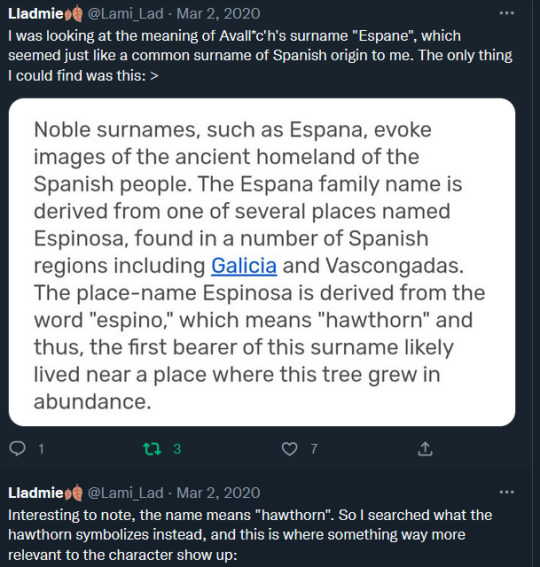
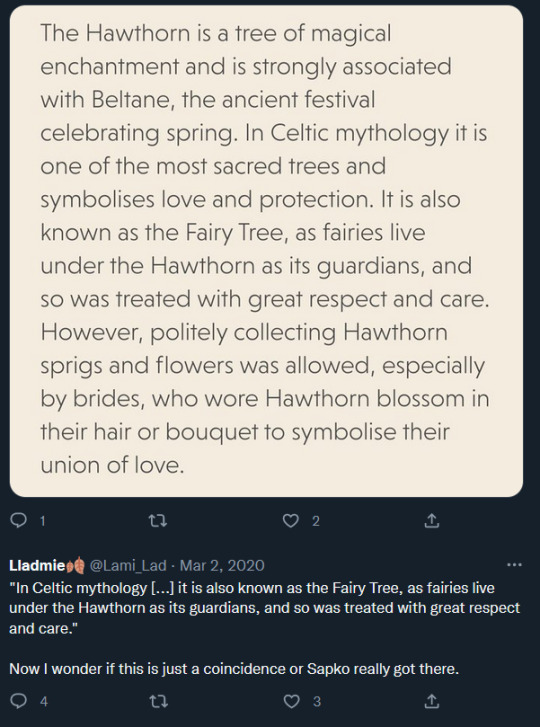
#avallac'h#aen elle#aen seidhe#the world of king arthur#celtic mythology#folklore#homespun etymologists unite!#the witcher#the witcher books
20 notes
·
View notes
Text

Peeira.
In Portuguese folklore these are women said to connect with wolves and run through the villages and such along with the wolves at night.
#folklore#portugal#peeira#my own#art#drawing#illustration#tradition#european#gallaecia#celtiberian#lusitania
34 notes
·
View notes
Text

"The Celts were there, too, who, as Celtiberi, have added the Hiberi to their name. To die in battle is glorious to them, to cremate the body
of such as do a crime, since they believe the spirit goes to the gods if some ravenous vulture eats the dead flesh".
-Silius Italicus, Punica.
Gustave Doré, A Celtic Sky Burial, 1866.
#Celts#Celtiberians#sky burial#tower of silence#Europe#R1b#Europeans#ritual#vulture#battle#religious#european religion#Bell beaker#Punica#silius italicus#dore#gustave dore
65 notes
·
View notes
